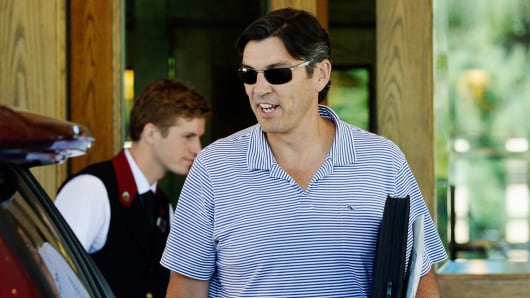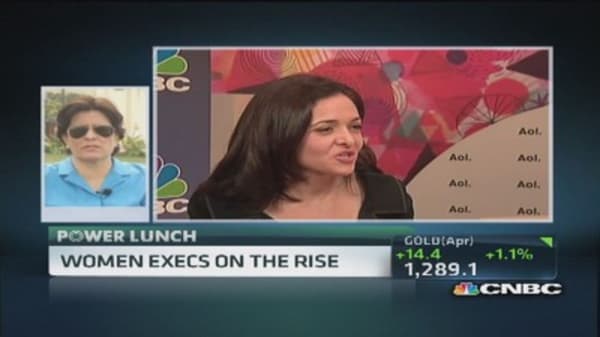The outcry over AOL Chief Executive Tim Armstrong's comment that the birth of two "distressed babies" led to his decision to change the company's 401 (k) plan was jaw-droppingly callous. But it is only part of the real story. When the firestorm hit, this particular CEO was able to walk back his comment and reverse the decision to scale back employee benefits. But under the radar, kicking the foundation away from employee retirement security is looking more and more like the new normal.
Private-sector pensions have been declining for decades — for average workers. Only 18 percent of private-industry employees were covered by defined-benefit plans in 2011, compared to 35 percent in the early 1990s, according to the Bureau of Labor Statistics. Pensions have been replaced by 401(k) retirement-saving plans that generate tidy fees for Wall Street (fees can consume nearly one-third of a two-income family's investment returns, according to public policy organization Demos) and, unlike pensions, impose market risks on employees.
(Read more: What's behind AOL's Obamacare blame game)
But, it turns out that gutting corporate pensions may have been just the beginning. AOL's scheme, which is already in place at IBM and a number of other corporations, was to make a single, annual lump-sum 401(k) matching contribution. So, anyone leaving the company before Dec. 31 would lose the entire year's worth of matching contributions. Not only is that a huge cut in employees' total compensation, but it also undermines the portability feature of 401(k)s thereby creating a new form of "job-lock."
As troubling as this rollback of employees' compensation is, we should be equally worried about the extraordinary largesse doled out to top executives. The contrast between the treatment of average workers and CEOs could not be more striking.
Post-employment compensation for top executives replaces 60 percent to 100 percent of their income, according to Wall Street Journal analysis of corporate filings; for average workers, the rate drops to 20 percent to 35 percent.
It is not as if CEOs can't set aside a nest egg on what they are paid. For example, in 2012, Tim Armstrong received more than $12 million in total compensation, 348 times the average AOL worker's compensation of $34,645.
(Read more: Mom of 'distressed' baby speaks out)
It is time to take a hard look at the mechanisms top corporate executives use to shift corporate wealth to themselves. Armstrong's lump-sum 401(k) maneuver provides an instructive example. It amounted to an appalling wealth transfer from AOL's employees … to whom? Well, nominally to shareholders, in the form of increased profits. Of course, however, CEOs point to higher profits to justify their own raises, in effect siphoning off a portion of the increase before it ever gets to shareholders.
Undoubtedly everyone agrees that corporations like AOL do not exist for the benefit their CEOs. But neither do they exist solely for the benefit of shareholders. The constant demand for more profits for shareholders inevitably leads to intra-corporate wealth transfers — like the 401(k) switcheroo — not wealth creation.
The better solution is to agree that corporations are comprised of many types of stakeholders, including employees; loyal customers; reliable vendors; local communities that provide good schools, public safety and other services; the environment that may be drastically impacted by the firm's operations; and, to be sure, CEOs and shareholders. All of these stakeholders help make the corporation profitable and all should be entitled to share in the corporation's prosperity.
(Read more: The silver lining of the Affordable Care Act)
It's no wonder that workers who labor for companies with CEOs like Tim Armstrong feel exploited and disrespected. They are — and not just by dismissive, demeaning comments about "distressed babies."
No doubt Tim Armstrong will choose his words more carefully when next he talks about his company's responsibilities as an employer. But for every Tim Armstrong, there are a dozen other overpaid executives who would agree with Mitt Romney's 47-percent comment about "takers" who don't appreciate everything that the millionaires and billionaires do for them. We should take this opportunity to read between the lines of Armstrong's insult and strengthen what's really distressed — average workers' compensation and pensions.
— By Terry O'Neill
Terry O'Neill, feminist attorney, professor and activist for social justice, was elected president of the National Organization for Women in 2009. She is the principal spokesperson for NOW, the NOW Foundation and the NOW PAC. Follow her on Twitter @TerryOneill.




